July 23, 2025
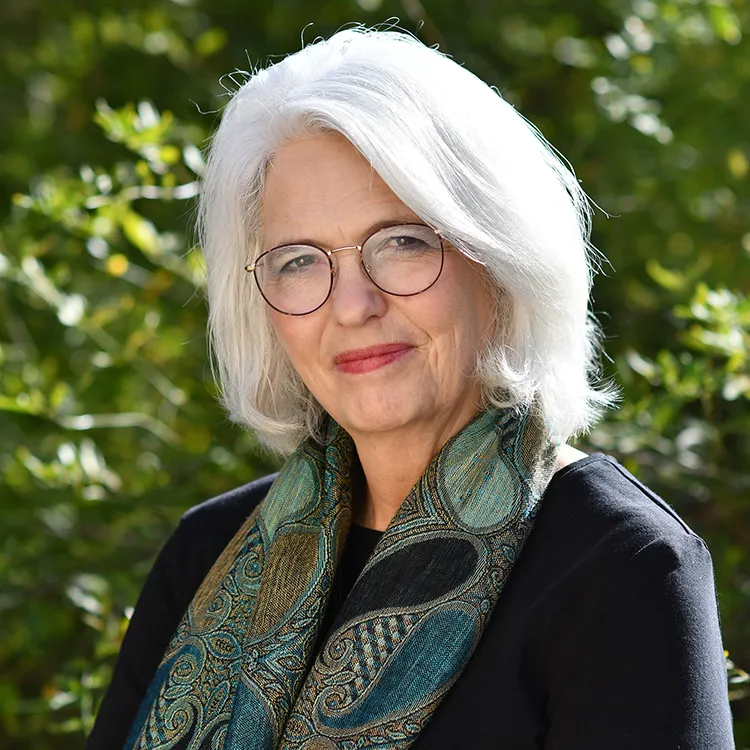
It is often said that true excellence leaves a mark long after one’s departure. In the case of Dr. Laurie Scott, this was literally true. Though she had already retired as Associate Professor of Music and Human Learning at the University of Texas at Austin, the College of Fine Arts honored her with its Distinguished Teaching Award, an accolade that speaks volumes about her enduring impact and legacy.
My own introduction to Laurie came when my children were new participants in the University of Texas String Project, and I would watch, Saturday after Saturday, as Laurie led the program with masterful command. Hundreds of young musicians filled the space, each one engaged and attentive. The precision with which she directed the program was astonishing. Yet behind the seamless coordination was something even more compelling: a profound passion for teaching.
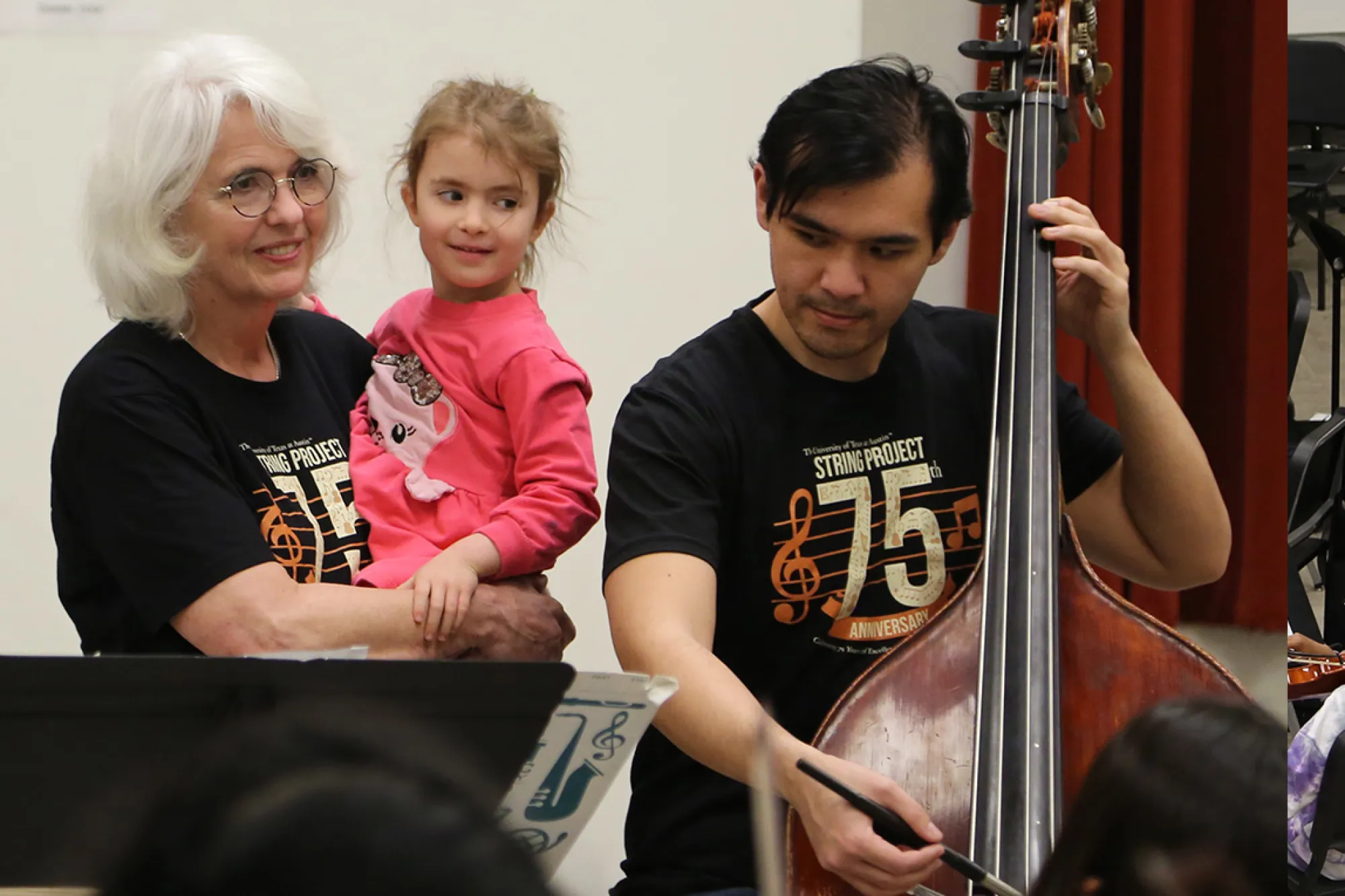
Laurie Scott showing a young String Project student a Bass
Now a few months into retirement, Laurie remains as engaged and energized as ever. “I cannot stop teaching, I am addicted to it,” she admitted with a laugh. True to her word, she continues to teach graduate students part-time at Buffalo State University, in addition to preparing for international workshops, developing online music education courses, building a private studio, and designing curriculum for the University of Texas High School. Teaching, it seems, is not something she ever intended to leave behind.
Her decision to move to New York after retirement had nothing to do with music and everything to do with her love for nature and being close to family. “I grew up here,” she shared. “I love the seasons, and I am closer to my family now. If I could live outside, I would. If I could have an office outside, I would. I love being outdoors, and the cold does not bother me. In Texas, the heat was hard.”
That same sense of clarity and conviction infuses her approach to teaching. When asked what defines her pedagogy, she replied, “I am exceedingly optimistic about people. It can be exhausting, and it does not always work out, but more often than not, when you really invest in someone, they rise to the challenge.”
For Laurie, teaching is not merely instructional; it is transformational. “I have a vision of where I want my students to be, and I will do whatever it takes to help them get there,” she said. “I do not shy away from the underdog. Not everyone is going to be a superstar, but if someone truly wants to teach, it is my job to help them succeed.”
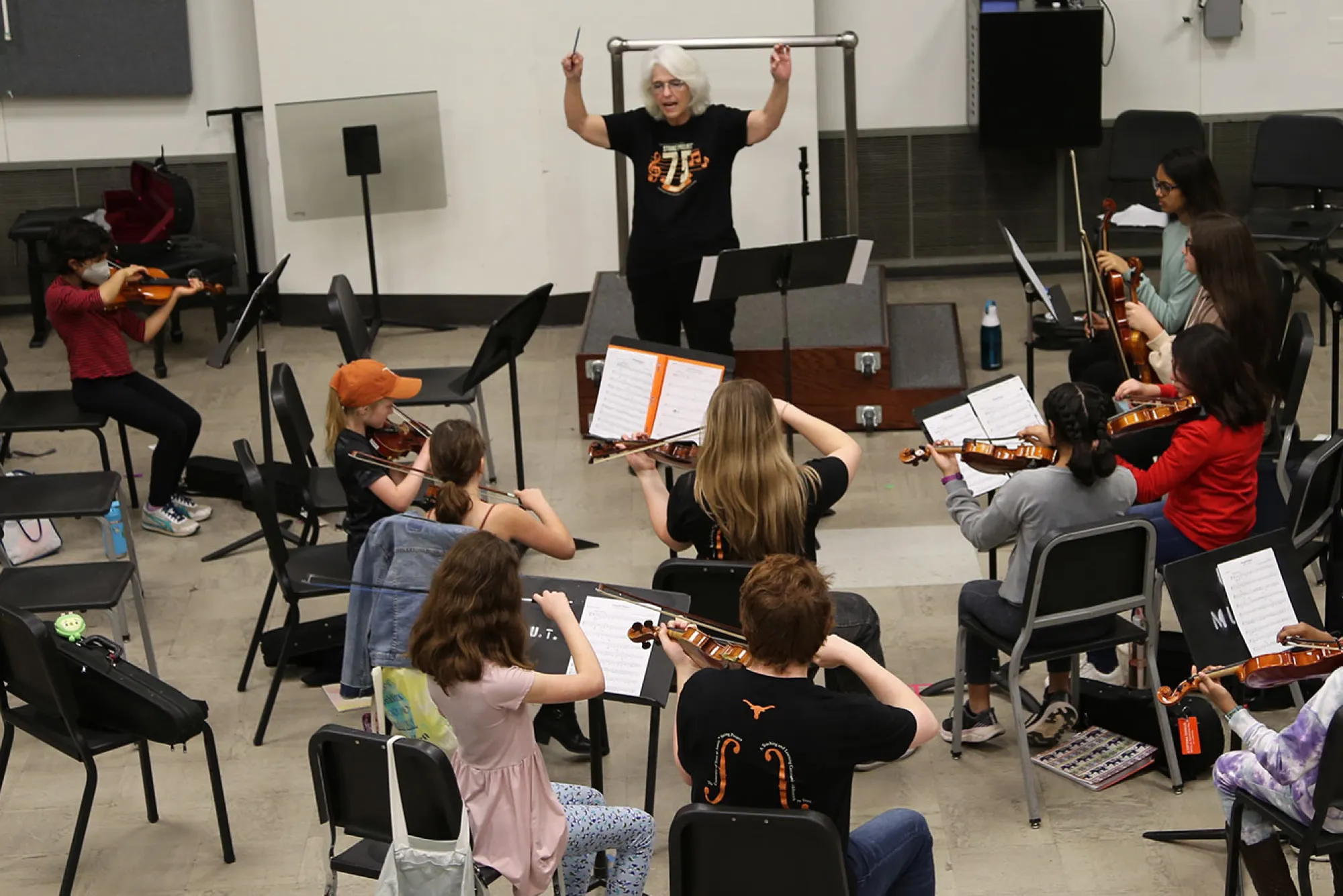
Laurie Scott Conducting a Chamber Orchestra
She champions the development of lifelong learners. “I teach my students that it is okay not to know something. In fact, it is good, it keeps you curious,” she explained. “Your degree is just a starting point. You can teach for twenty years and still not do it well if you are not constantly learning. There is no finish line. You have to keep investing in yourself.” With characteristic humility, she added, “I never pretend to know something I do not, and I am always looking for ways to improve.”
What distinguishes Laurie’s career is the sheer breadth of her experience. She has taught everyone from babies in early childhood classes to doctoral candidates. Whether through the String Project, public school classrooms, youth orchestras, private lessons, or university instruction, she has met each student where they are, while encouraging them to aim higher.
“I love the baby classes,” she shared. “Middle schoolers are fascinating if you go in with the right mindset. And high school students are incredible because that is when they begin to internalize music as a part of their identity.”
When Laurie first started teaching, tools like the internet, personal computers, smartphones, and video conferencing were still science fiction. Has technology helped or hurt teaching? For Laurie, the answer is that it’s been mostly positive, though with some caution. “Technology amazes me. It’s incredibly efficient. I can’t say it makes teachers better on its own, but it gives you the chance to be more efficient.”
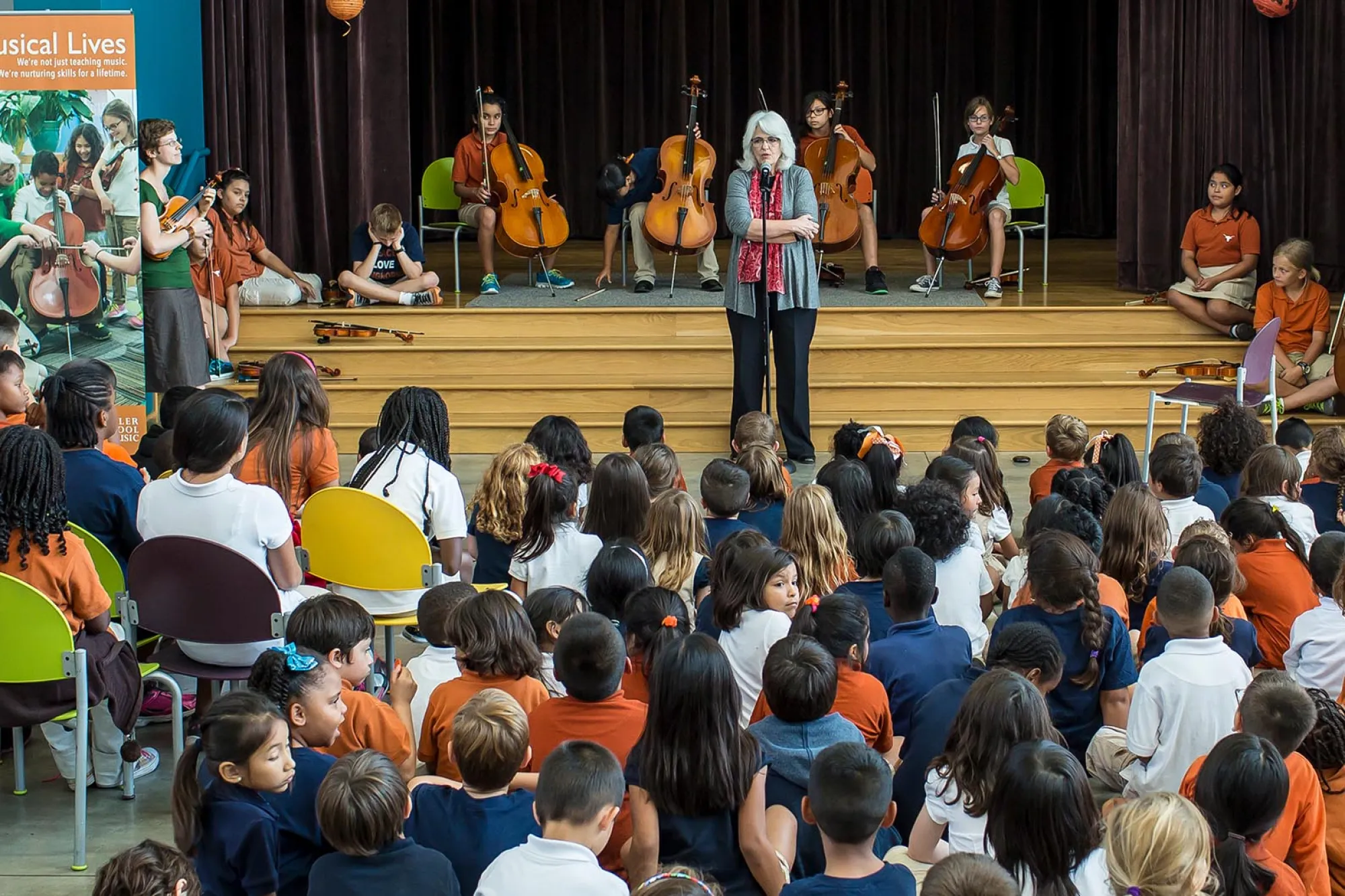
Laurie Scott engaging in community outreach
Video, in particular, has transformed how she teaches: “If I can’t have a student right in front of me, showing them a video of me teaching someone else is the next best thing. When they see it, it clicks, it makes a big impression.”
One thing that might surprise people is Laurie’s nuanced take on the Suzuki method. While she identifies as a Suzuki teacher, her teaching is pedagogically eclectic, well-versed in the tenets of all major approaches to string instruction.
“I love the emphasis on listening as a major pillar of Suzuki methodology. I can instantly hear the difference between students who listen to recordings and those who don’t. Listening teaches so much, including musical nuance and articulation. It can be hard to explain something like exactly when to vary vibrato speed or how long to hold a fermata. But when students hear great recordings of the music they’re playing, it all starts to make sense.”
In speaking with Laurie, what becomes most clear is that she truly embodies the essence of a teacher, driven by curiosity, rooted in purpose, and committed to growth. Her career has spanned decades and touched thousands of lives. Even in retirement, her work continues to evolve.
Laurie Scott may have stepped away from her official classroom, but she has not stopped teaching. And if her students are any indication, she never will.
Reflections from Former Students
As I gathered reflections for this article, I was struck by the consistency of the praise from Dr. Scott’s former students. Across backgrounds, professions, and generations, they speak of her with reverence, gratitude, and admiration. They do not merely describe a music teacher; they describe a mentor who shaped their lives. As Dr. Kelsey Nussbaum shares, “Within the UT String Project, Dr. Laurie Scott cultivates an unparalleled community of passionate and engaged string educators… I strive to achieve the same level of compassionate mentorship with my students.” This sentiment is echoed by Andres Hernandez, who explains, “Her dedication... has inspired me to advocate for diversity in the arts and to mentor others. Through her guidance, I have embraced the responsibility of using music as a tool for positive societal change.”
Many credit Dr. Scott not just with shaping their pedagogical practices, but with instilling enduring values that now define their careers. “Not a day passes where I don't think about or utilize the lessons passed on by Dr. Scott,” writes Dr. David Saccardi. “She is an exemplar for music educators… ‘research manifested’… and, most important, she is an unflaggingly kind human being.” Her capacity to blend rigorous scholarship with deep human connection is a consistent thread across these reflections. As Dr. Elizabeth Chappell notes, “Dr. Scott often says, ‘You never know who you have in your classes,’ meaning that each student has potential. No one should be overlooked, and all students deserve our best efforts every day.”
Her approach to teaching prioritizes joy and community, as Matthew Chan affirms: “Every child, regardless of their background or differences, is both capable and deserving of an education that fosters their growth… The lasting influence Dr. Scott has had on me is immeasurable.” This legacy extends across institutions and generations. “Dr. Scott remains one of my greatest influences,” writes Dr. Lani Hamilton, “inspiring me to mentor my students in ways that connect theory to practice and empower them to contribute meaningfully to their communities.”
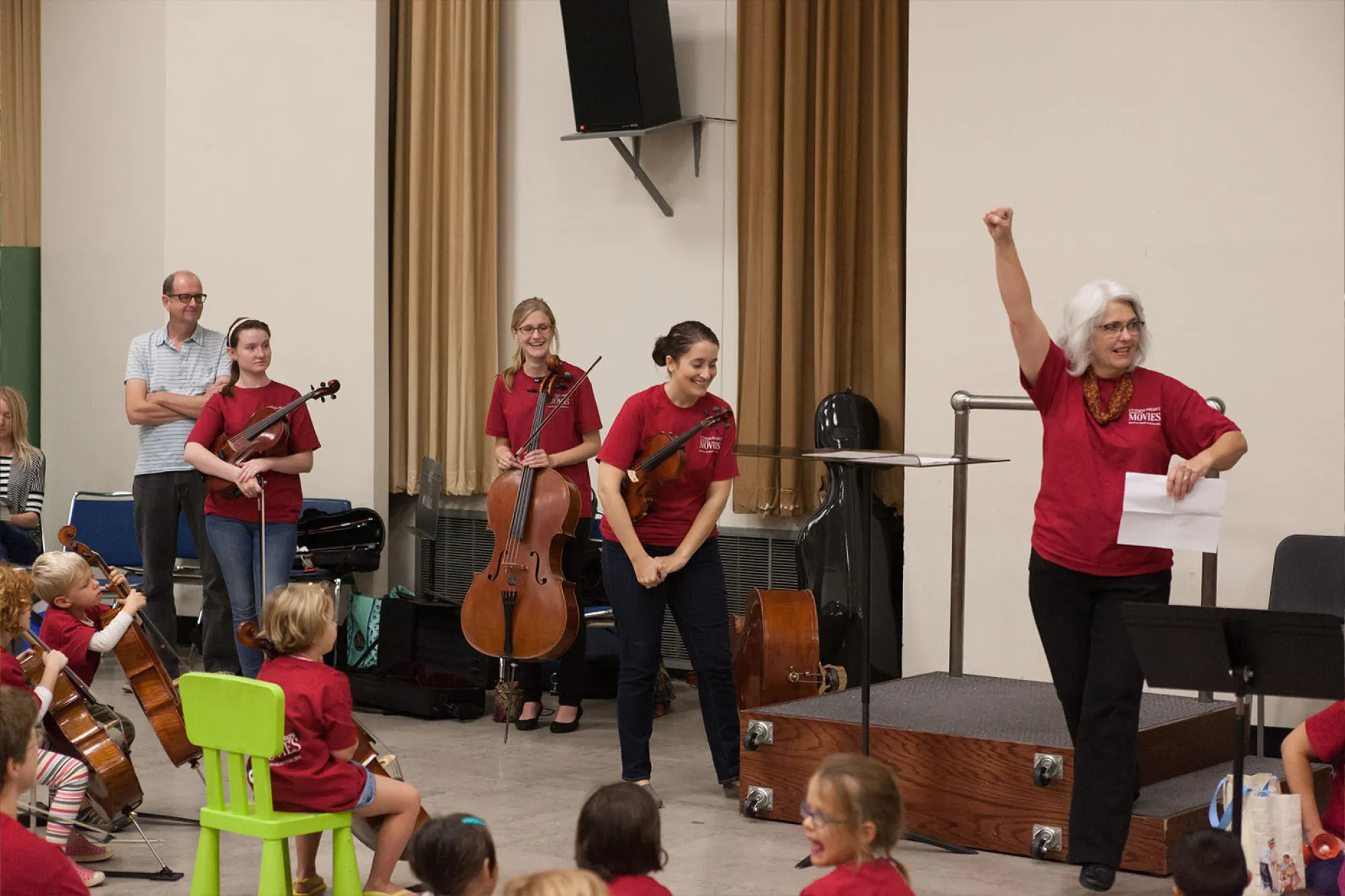
Laurie Scott teaching future teachers and young students at the same time
Several students describe Dr. Scott as the driving force behind their confidence, creativity, and pedagogical courage. “She encourages her students to ask bold questions, to challenge conventions,” writes Adriana Rizk. “Dr. Scott has given me the courage to embrace risk and creativity in teaching… Her wisdom and passion have and will continue to inspire generations of educators and musicians.” Eva Van Houten echoes this: “Most importantly Dr. Scott demonstrated that music education should be a joyful experience and that everyone should be included.” Her mentorship has not only touched students at UT but extended to other learning communities like the Texas School for the Blind and Visually Impaired.
Her influence is not limited to individuals, it extends to entire systems of teaching. “I am a dramatically more effective and well-rounded educator as a result of her mentorship,” says Laura Bock. “She has been a hugely positive force for students, colleagues, and community members… creating joy, learning, and amazing community collaboration every week for 200+ people.” Kyra Hong describes this presence as one that goes beyond musical instruction: “Dr. Scott’s impact applies not only to music but also to passion and dedication throughout our daily lives.”
Others, like AJ Marks, emphasize the tangible professional growth made possible through her mentorship: “Through my time in the String Project, I gained invaluable teaching experience… I’m able to inspire and guide my students in ways that go beyond music.” This theme of empowerment through mentorship is a constant. Dr. Martin Norgaard affirms, “Through her instruction and mentorship, I learned the value and impact of classroom string instruction,” while Jennifer McKeeman adds, “Dr. Laurie Scott is a teacher of teachers… her greatest strength lies in her ability to connect with each individual who crosses her path and make them feel seen.”

